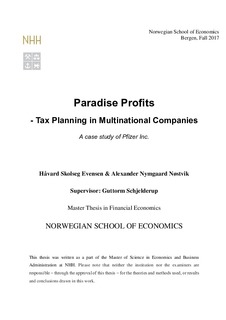| dc.description.abstract | In recent years, it has become increasingly evident that current tax regulations are not properly
equipped to handle the business structures of multinational companies. A number of
revelations and leakages have exposed how such companies, often from the US, make use of
tax minimization strategies in order to shift profits and reduce tax liabilities. In this thesis, we
examine the inner workings of these arrangements, and analyze the extent of aggressive tax
planning in the pharmaceutical company Pfizer. In our preliminary analysis, we find that the
company is able to defer large amounts of income tax by stashing $187 billion in profits
offshore, ultimately resulting in an effective tax rate of 0.28 percent in 2016. In our work to
identify Pfizer’s methods of profit shifting, we find evidence of, inter alia, tax-incentivized
location of patents, excessive tax burden in the US and a tax-exempt CV/BV conduit structure
in the Netherlands. We thereby conclude that Pfizer exploits loopholes in international tax
regulations in order to significantly reduce their tax liability. | nb_NO |
